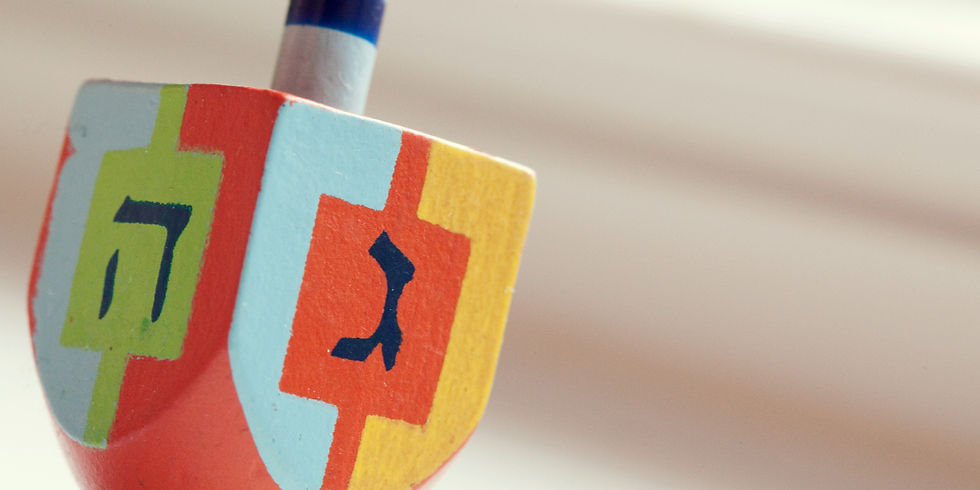Finding Light in Deepest Darkness: Lessons from Parashat Miketz & Hanukkah
- Yudit Rosenbaum
- Jun 11, 2025
- 4 min read

L’ilui nishmat Harav Shlomo ben Reb Yitzchak and my beloved father, a guiding light and eternal source of inspiration.
Good morning, everyone, and Happy Hanukkah!
This message is dedicated l’ilui nishmat (for the elevation of the soul of) my beloved father, who left this world 22 years ago—my mentor, my guide, and eternal source of inspiration—and for the elevation of the soul of my dear husband.
May this shiur (Torah lesson) also be a refuah sheleimah (complete healing) for Marasel Bana and a zechut (merit) for the hostages, prisoners, and all the brave IDF soldiers. May Hashem (God) send us open and revealed miracles in these precious days of Hanukkah.
Miketz: The End of Darkness, The Beginning of Light
Parashat Miketz is always read during Hanukkah. The parasha opens with:
“Vayehi Miketz Shnatayim Yamim…” “And it was at the end of two full years…”
This signals Yosef's redemption. After years of darkness, he is elevated from prison to palace, mirroring the journey from exile to salvation.
Chazal (our Sages) teach that the word "Ketz" (end) connects to the verse:
"Ketz sam la’choshech" – “He [Hashem] set an end to darkness.” (Iyov 28:3)
This is not just physical darkness, but spiritual confusion—the kind that clouds vision, values, and identity.
💡 Did you know? The gematria (numerical value) of “קץ” (Kuf = 100, Tzadi = 90) is 190, corresponding to the 190 years the Greek exile would last, according to the Midrash on Yaakov's ladder dream. This connection highlights Hashem's precise timing for redemption.
The Subtle Darkness of Yavan (Greece)
The Greek exile wasn’t about the destruction of bodies—it was about the erasure of the Jewish soul. The Greeks outlawed:
Shabbat
Rosh Chodesh
Brit Milah
These aren’t just laws—they’re the heartbeat of our Jewish identity. The Greeks were happy for Jews to remain—so long as they gave up their emunah (faith) and uniqueness.
"Tohu vavohu, v’choshech al pnei tehom..." “Chaos, void, and darkness upon the deep…” (Bereishit 1:1-2)
Chazal interpret these primordial elements as alluding to various exiles:
Tohu = Babylonian exile
Vohu = Persian exile
Choshech = Greek exile—because it was a subtle, intellectual darkness, one that seduced rather than crushed our spirit.
Hanukkah: Illuminating Identity and Miracles
The miracle of the Hanukkah oil—lasting eight days instead of one—was not just about flame, but about the preservation of Jewish identity and our spiritual separation.
Why olive oil specifically?
Olive oil never mixes with other liquids.
No matter what surrounds it, it rises to the top.
So too with Am Yisrael—we cannot assimilate. It’s against our spiritual DNA. This profound metaphor teaches us the enduring strength of our heritage.
"Lo b’chayil, v’lo b’koach, ki im b’ruchi..." “Not by might, nor by power, but by My spirit.” (Zechariah 4:6)
This verse, read on Shabbat Hanukkah, reminds us that Hashem is our true strength, not armies or numbers. Even amid a 25-year war, the Chashmonaim (Hasmoneans) famously paused in year three to celebrate Hanukkah. Why? Because the miracle of the oil was profound proof of Hashem's presence and that their mission was not only military, but deeply spiritual.
Lighting the Menorah: Reigniting Daily Passion
The number eight represents the supernatural—that which is above nature, beyond human reason. This concept is central to the Hanukkah miracle.
The word Hanukkah itself can be read as:
“Chanu Kah” – “They rested on the 25th [of Kislev]”
This alludes to the 25 letters in “Shema Yisrael... Hashem Echad”—the ultimate declaration of emunah and unity. Hanukkah was the last mitzvah D’Rabbanan (rabbinic commandment) instituted—to give us light in the darkest of exiles.
We light the menorah by the entrance or window—to proclaim that even when the world is dark, we illuminate it with Hashem’s presence. Every Hanukkah candle we light carries a powerful message:
Hashem is here.
Miracles happen.
Our Avodat Hashem (service of G-d) should never be rote.
Just like Aharon HaKohen lit the Menorah daily with devotion, so must we serve Hashem with warmth and joy.
The Pink Candle: One Small Act, Great Light
The true story of the pink Hanukkah candle reminds us of how even the smallest act of love and chessed (kindness) can ripple for decades, creating profound impact.
A father risked everything to get his daughter a pink candle. That cherished memory later saved her life in the Holocaust—when a familiar face recognized her from that story. So too, Yosef’s seemingly small act of interpreting dreams in prison ultimately led to his redemption and position of power.
✨ Never underestimate one mitzvah. One kind word. One genuine smile. One small candle.
Bringing the Light Home: Daily Inspiration
In these sacred days of Hanukkah and Parashat Miketz, let us be inspired to:
Bring spiritual light into our homes.
Say Shema with profound meaning.
Do one more act of chesed or kindness.
Believe that no darkness is too deep for Hashem to illuminate.
May Hashem bless all of Am Yisrael with yeshuot, refuot (healings), and geulah (redemption). And may our lights shine bright, guiding us always, until the coming of Mashiach speedily in our days.
Wishing you a warm, inspired Hanukkah and a Good Shabbos from Yerushalayim!




Comments